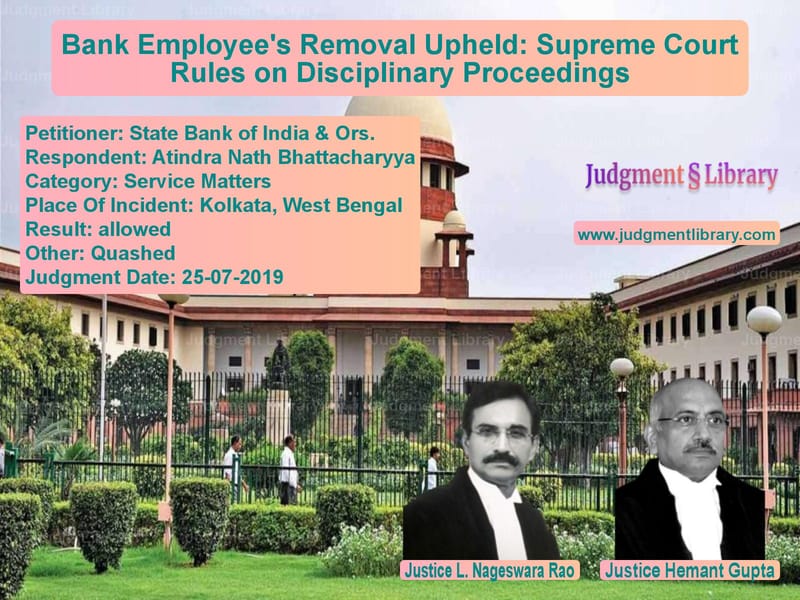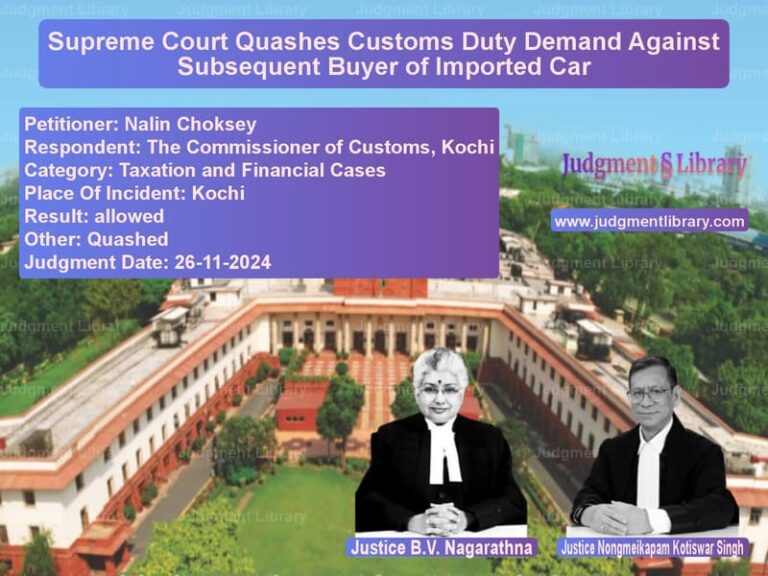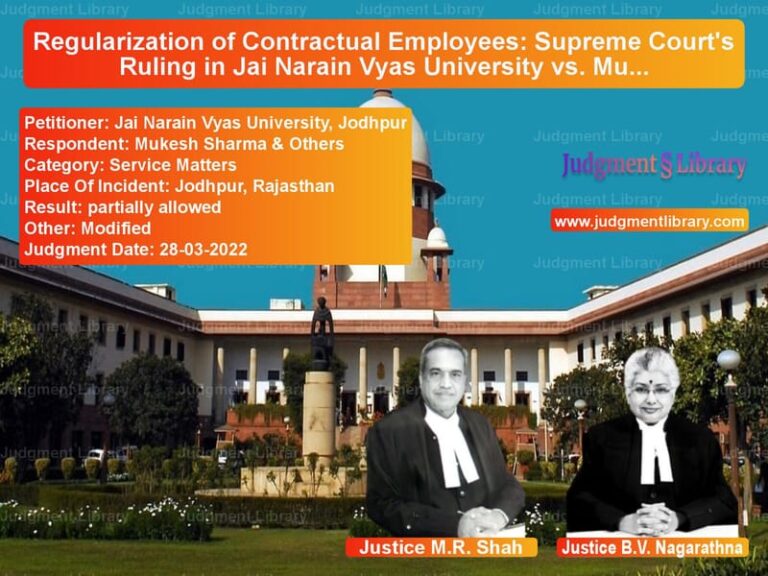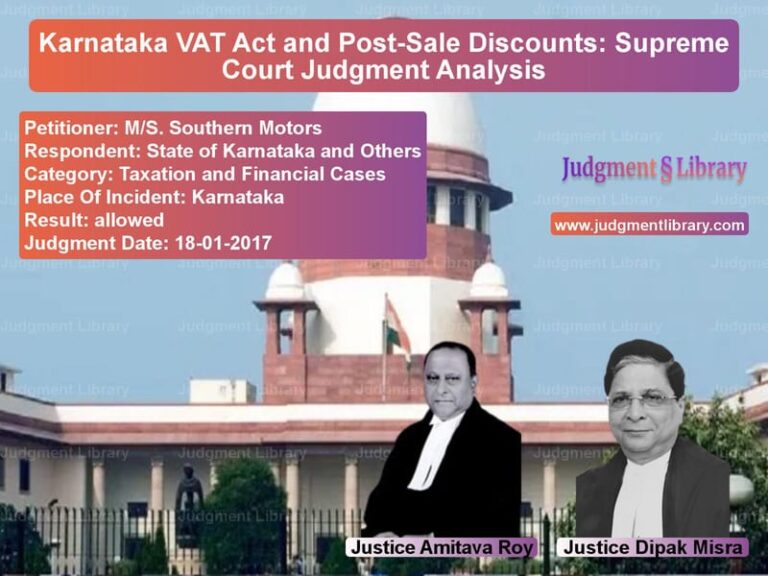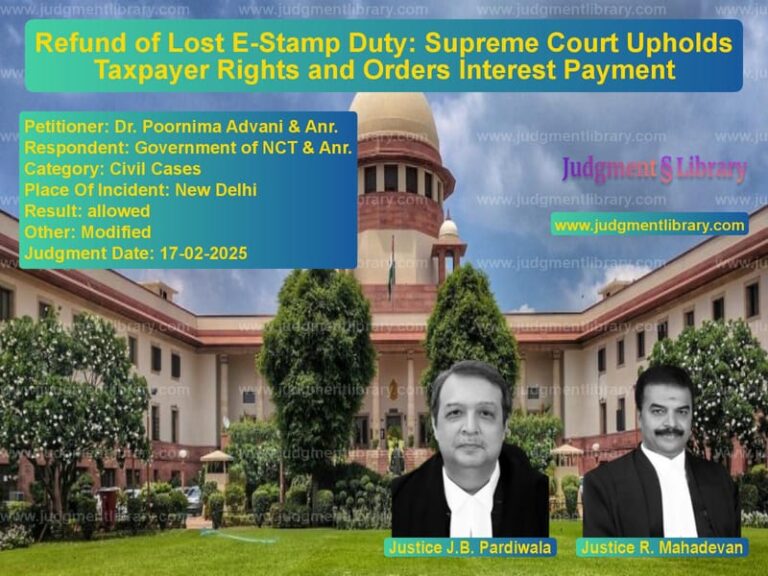Bank Employee’s Removal Upheld: Supreme Court Rules on Disciplinary Proceedings
The case of State Bank of India & Ors. v. Atindra Nath Bhattacharyya is a landmark ruling on disciplinary proceedings and the consequences of financial irregularities in banking institutions. The Supreme Court overturned the Calcutta High Court’s directive for a second opportunity of hearing, upholding the removal of the respondent from service for serious financial misconduct.
Background of the Case
The respondent, Atindra Nath Bhattacharyya, was employed as the Chief Manager of the Baghbazar Branch of State Bank of India from November 19, 1997, to September 9, 1998. During this period, multiple financial irregularities were detected, leading to disciplinary action.
Key Events in the Case
- On December 28, 1999, a charge sheet was issued against the respondent containing 16 charges of financial misconduct.
- An internal inquiry was conducted, and a report was submitted on January 14, 2002.
- On January 24, 2003, the appointing authority found the charges to be substantiated and ordered removal from service.
- The respondent’s appeal to the bank’s appellate authority was dismissed on April 19, 2005.
- He then filed a writ petition before the Calcutta High Court.
- On January 13, 2016, the Single Judge of the High Court ruled in favor of the respondent, setting aside the removal on the ground that he was not given an opportunity to present his case before the penalty was imposed.
- The bank did not challenge this ruling but instead offered a fresh hearing on March 24, 2016.
- The respondent refused to attend and challenged the High Court’s ruling through an intra-court appeal.
- The Division Bench of the High Court, on April 7, 2017, directed the bank to provide another opportunity for a hearing before finalizing the removal order.
- The bank challenged this directive before the Supreme Court.
Arguments of the Parties
Petitioner’s (State Bank of India) Argument
- The respondent was found guilty of serious financial misconduct, which caused substantial losses.
- He was given an opportunity to present his case but chose not to appear despite multiple notices.
- The requirement of a second hearing was not mandatory under law.
- The respondent deliberately delayed proceedings by filing appeals instead of attending the fresh hearing.
- The ruling of the Division Bench of the High Court was inconsistent with previous Supreme Court rulings.
Respondent’s (Atindra Nath Bhattacharyya’s) Argument
- He argued that he was denied a fair opportunity to present his case before the penalty was imposed.
- The bank’s failure to follow due process justified the High Court’s intervention.
- Previous Supreme Court rulings in similar cases had emphasized the importance of fair hearings.
- The order of removal was too harsh and disproportionate to the alleged misconduct.
Supreme Court’s Analysis
Validity of Disciplinary Proceedings
The Court examined whether the disciplinary proceedings followed due process. It noted that:
“The respondent had multiple opportunities to present his case but deliberately chose not to attend the hearings.”
Applicability of Judicial Precedents
The Court cited its previous rulings, including:
- Bank of India v. Apurba Kumar Saha (1994): Employees who refuse to defend themselves in disciplinary proceedings cannot later claim a denial of justice.
- State Bank of India v. Mohammad Badruddin (2019): Once an employee is given an opportunity for a hearing, repeated hearings are not required.
The Court ruled that the Division Bench of the High Court misinterpreted its previous rulings and applied them incorrectly.
On the Need for a Second Hearing
The Court rejected the argument that a second opportunity of hearing was necessary:
“Once the respondent has failed to avail of an opportunity of hearing, the bank cannot be directed to give another opportunity for the sake of justice.”
Nature of the Misconduct
The Court noted that the financial irregularities committed by the respondent involved substantial amounts of money and were severe enough to warrant removal.
“The allegations of financial irregularities against the respondent run into crores of rupees under multiple heads.”
Final Judgment
The Supreme Court set aside the High Court’s directive for a second hearing and upheld the respondent’s removal.
“Time and again, opportunity of hearing cannot be granted on the pretext of justice. The delaying tactics cannot be rewarded in such a manner.”
The appeal by the State Bank of India was allowed, and the removal order was confirmed.
Significance of the Judgment
- Reinforces Accountability in Banking: The ruling upholds strict disciplinary measures for financial irregularities.
- Prevents Procedural Delays: It establishes that employees cannot repeatedly delay proceedings by avoiding hearings.
- Limits Judicial Interference: The judgment ensures that courts do not unnecessarily interfere in well-conducted disciplinary proceedings.
- Sets a Precedent for Employment Law: Employees who refuse to attend hearings cannot claim that they were denied justice.
Conclusion
The Supreme Court’s judgment in State Bank of India v. Atindra Nath Bhattacharyya is a critical ruling in employment law and disciplinary proceedings. It reinforces the principle that procedural fairness is essential but must not be misused to delay justice. The decision ensures that financial misconduct in banking institutions is dealt with strictly while also upholding the rights of employees within the framework of due process.
Petitioner Name: State Bank of India & Ors..Respondent Name: Atindra Nath Bhattacharyya.Judgment By: Justice L. Nageswara Rao, Justice Hemant Gupta.Place Of Incident: Kolkata, West Bengal.Judgment Date: 25-07-2019.
Don’t miss out on the full details! Download the complete judgment in PDF format below and gain valuable insights instantly!
Download Judgment: State Bank of India vs Atindra Nath Bhattac Supreme Court of India Judgment Dated 25-07-2019.pdf
Direct Downlaod Judgment: Direct downlaod this Judgment
See all petitions in Employment Disputes
See all petitions in Disciplinary Proceedings
See all petitions in Termination Cases
See all petitions in Judgment by L. Nageswara Rao
See all petitions in Judgment by Hemant Gupta
See all petitions in allowed
See all petitions in Quashed
See all petitions in supreme court of India judgments July 2019
See all petitions in 2019 judgments
See all posts in Service Matters Category
See all allowed petitions in Service Matters Category
See all Dismissed petitions in Service Matters Category
See all partially allowed petitions in Service Matters Category

